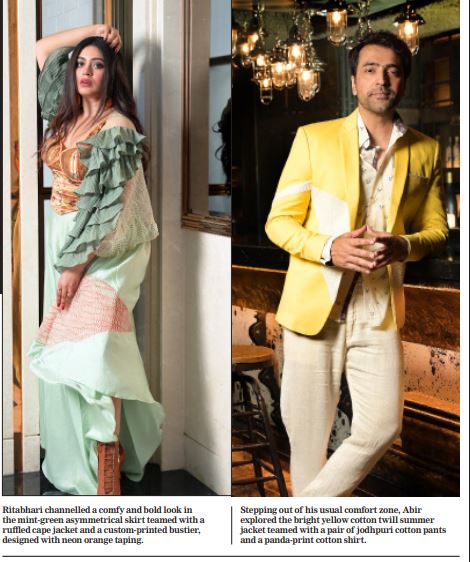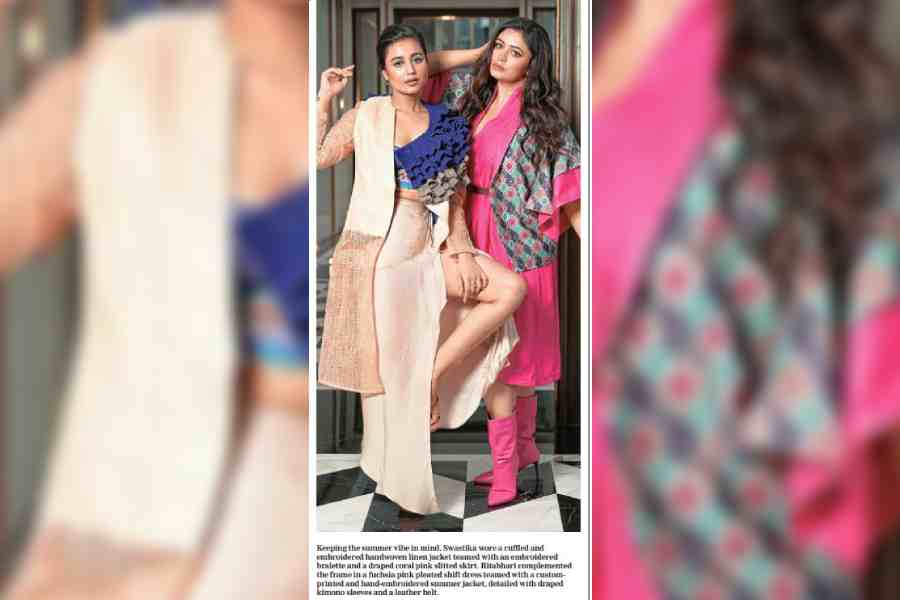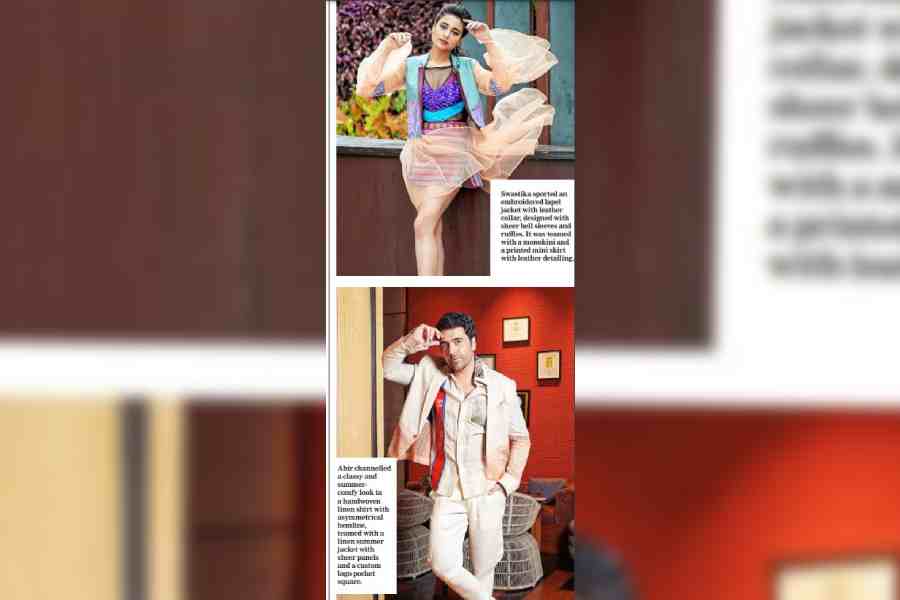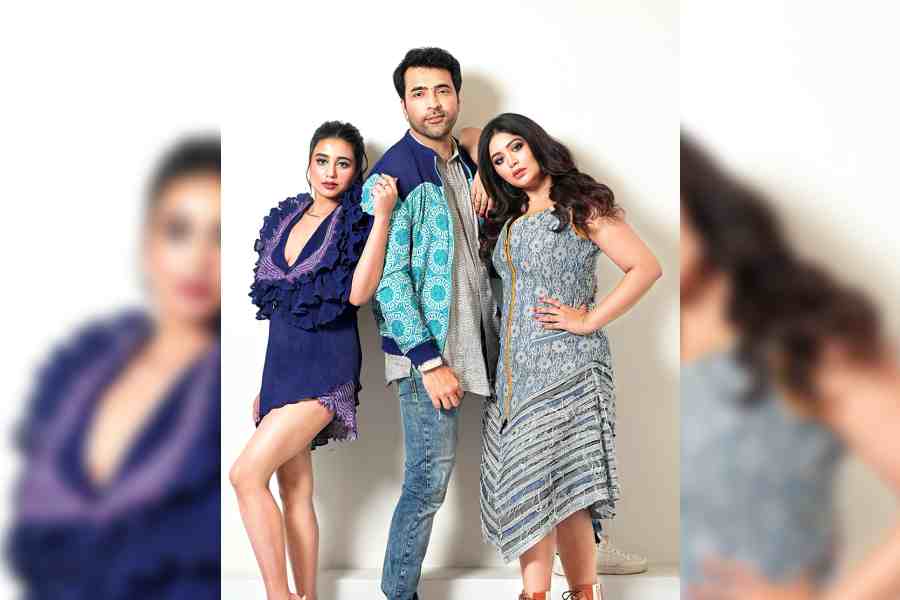Though the world of fashion has time and again been a chosen subject for movie makers, the Bengali film industry has rarely explored the subject widely. Aritra Mukherjee’s Fatafati, a Windows Production film, finally delves into it while structuring its story around body positivity. Set to release on May 12, the film stars Abir Chatterjee, Ritabhari Chakraborty and Swastika Dutta. The much-awaited film has a climax to look forward to, the hint of which was given in the trailer. Designer Abhishek Dutta, who orchestrated a fashion show for the climax, gives us a hint of what to expect and creates a summer mood board exclusively for t2 featuring the three actors. He decked them up in various silhouettes that define their comfort zone and also stepping out of it, giving them styles that allowed them to channel confidence, style and a sense of comfort while giving out the message that fashion is for all when embraced with confidence. Excerpts from the style chat with the cast:

Has your idea of fashion evolved over the years?
Abir Chatterjee: I had zero knowledge about fashion and I still have zero knowledge. Thankfully, I have people around me who have their formal education and knowledge on it and guide me accordingly. I think it is our professional responsibility to dress up properly. I have a corporate background, so I know that it is our responsibility to look good and be presentable. During childhood, I remember people saying that women can invest time in deciding their costumes but men can’t. Now, I am thankful to my team who suggest me. Ritabhari Chakraborty: For me, fashion has always been about what makes me look and feel good. But over the years I have realised that the feel-good part is very important. I am a comfort-chic believer. There’s a lot of high fashion that I appreciate on other people but not on myself. Not because it won’t look good on me but because it is something I won’t feel comfortable in. It is all about decking up myself. That has always been the meaning but now I have also leaned towards comfort. Swastika Dutta: To some extent, fashion for me has always been about creating an impression. Nowadays, fashion is bold and daring. I find it very impressive. It has changed over the years because we aren’t afraid to say what we wear or think. In today’s world, fashion is a way of life. Like other basic needs, clothing is also one of the most essential elements of life.
How would you define your personal style?
Abir: Minimalistic and comfortable.
Ritabhari: Comfort-chic.
Swastika: Trendy yet very comfortable and classy.
None of you entered your profession from the fashion world but style and fashion have a role to play to some extent in your profession. Did you have to consciously groom yourself in this respect?
Abir: In the initial days people used to think so much mindspace should not be given to how one looks. I feel that I have also evolved my style over the years. The audience spends their hard-earned money to see us. So, yes I have consciously tried to learn new things from people who are in this field. At times pampering ourselves is also very essential. It is very important for a longer career also. It is not a luxury. It is a necessity. It is investing on ourselves. We need to be at our best physically and mentally.
Ritabhari: Grooming is something that never stops. I still groom myself. I still think about what will make me look better, speak better and perform better. Grooming in all ways, not just how I look. For me, my most glamorous ornament or rather armour is my confidence. Also, when we start working young we cannot protest a lot about what people are making us wear or how they want us to look. When I was younger people used to bring Aishwarya Rai (Bachchan) and Deepika Padukone references and say that we will do this look, not realising that I am Ritabhari Chakraborty. You have to see my body, my face and see what looks better on me.
Swastika: Yes, absolutely. With each passing day, I am grooming and learning. It’s very true I had no idea what this glamour industry wants when I started my career. I just got into the shoes and groomed myself.
Do you like to experiment with your style?
Abir: Not much, but yes, I have evolved
Ritabhari: I am. I am a believer of comfort chic but I like experimenting with high fashion too. Recently I wore a sari with sneakers for a red carpet look because there was an after-party to enjoy. I like high fashion but it should make me feel good about myself.
Swastika: I don’t like experimenting with my personal style
One positive and negative aspect of fashion that impacted your life...
Abir: I would say it is all positive. My vision has also changed. It has evolved.
Ritabhari: Positive is with Internet access we get so much information on fashion and brand collaboration and getting to wear them and show up. This is such a huge part of an actor’s life. But the negative is the troll and not being able to repeat.
Swastika: The positive aspect of fashion is it enhances human life because not only it allows us to dress fashionably but also gives us an opportunity to be independent in our thinking, helps to maintain self-esteem and serves as a form of entertainment. The negative aspect is extreme competition.
Do you think the fashion fraternity could make the journey of embracing fashion easier?
Abir: Yes. Previously, even in my childhood, we were presented with clothes and we would take it to the tailor to get the fitting done. But over the years there has been this constant need to fit in, fit in different sizes like S, M, L, XL. If they include more people that would be great. Even today people think fashion and styling are for niche people. But people need to realise that even in their day-to-day activities they can have their own style.
Ritabhari: A lot. I don’t know how for so long it only catered to the elite and I think that has to revolutionise. If normal people can’t enjoy fashion, who are you making it for? Why shouldn’t a common man get to wear it?
Swastika: I hope it does. It should...
The best and worst fashion advice you have ever got…
Abir: In the initial days of my career, people told me that I need to have six packs and biceps and all. Thankfully I didn’t listen to them. They told me I should wear this and that when I am going to a premiere. But giving more time to fitness is something I should have started earlier.
Ritabhari: Best is always invest in lingerie and shoes. Worst is wear something that looks skinny.
Swastika: I don’t listen to any random person when it comes to fashion unless he or she is looking after my clothes and style statement for years.
Look is stereotypically an intrinsic part of your profession. Was there any beauty or look stereotype that bothered you when you all got your first break in the industry?
Ritabhari: I was 15 years old and not fully developed. I was going through puberty but I was a late bloomer that way and I was doing the serial Ogo Bodhu Sundari. I was told I am not voluptuous. They have an issue if she doesn’t have breasts. And then they will say she is showing too much. I have seen both sides.

Were you ever asked to fit in or did you tell yourself that you have to fit in?
Ritabhari: Yes, I have been told many times but then at the same time I am an oddball and someone who can fit in anywhere. I am welcoming and fit in anywhere. When I gained weight for Fatafati, a producer told me I should only wear Indian clothes till I have that weight on my body. It shows thighs and nobody wants to see big thighs... I realised that all this is unnecessary and I walked on my own path. Every actor has their own journey. I focussed on mine and what my audience wants from me.
Swastika: I thought I am not going to do what anyone else wants. But there are people who always say that why don’t you follow her or him...I don’t understand what’s there to follow and why? I literally wish to ask all of them have you ever told Alia Bhatt or Rekha ji or Madhuri Dixit or Aishwarya Rai to follow us? So yeah when I started off my career I was told I had a really broad jawline which I agree I have or had may be. I need to show my neck line as in my collar bone and my face needs some injections and fillers…so yeah there were many who told me I don’t fit in… because I was 68kgs standing in front of the camera...2015 it was.
Have you ever felt that the bias of fitting in is also gendered?
Ritabhari: It is for both men and women. But more towards women. That is because our heroines are considered replaceable. There are superstars still romancing actresses from the younger generation but you will never see the opposite happen.
Abir: There are biases and stereotypes. Changes are happening but still miles to go. But the bias is both ways. Till today a man is ridiculed if he spends more time in grooming. But it is true that towards females, people are more judgemental. Till today a female artiste is judged for her looks. But things are changing and they should change more rapidly.
Ritabhari you have been very brave to share your journey of self-love on Instagram with all of us. What has both of your journey of embracing yourself been like?
Abir: We keep on doing that. As artistes, we keep doing that. That helps us to be more in touch with ourselves. After a certain point it helps us to introspect ourselves. We should do it more often.
Ritabhari: It was liberating. The most important relationship we have is with ourselves. No matter how hard it sounds... your parents may die and your friends may be busy, you will have yourself. So you got to really take care of yourself. Definitely the heart and soul but also all the organs. They need to function well till the end.

Are any of you fitness freak?
Abir: Not a freak because freak has a negativity attached. I would say dedicated and consistent.
Ritabhari: I am a fitness freak. When my surgery happened I could not work out because I was not given permission by my doctor. I used to not eat. I could build up for a second surgery. I couldn’t recover only. In six months I had to focus on rebuilding myself. When the offer of Fatafati came to me, I had already gained five kilos and I had to gain 20 more for what Atitra was wanting. I had to stop the workout. I am a very active person. I had to stop being so active. But when I saw the film it was worth it. After my surgery when I gained the weight I was made to feel that I did something wrong but all I did was to look out for myself or take care of myself so that I live. That time puja campaigns were happening. I went out. I don’t know how I get so much confidence... there are so many people texting me saying thank you for doing this film…it looks like us. When we are young we think we are invincible then we think nothing will happen to us but then when life hits you twice by the time you are 27, you realise nothing is worth putting your health at risk. I am doing the best for my body. Not only what looks best but feels best. That way I am a fitness freak. Not about how many hours I spend in the gym but how much water I drink, whether I have eaten fruit or not, whether there is salad on my plate...
Swastika: Well I am health conscious but I won’t say I am a fitness freak. I believe in balancing meals and working out every alternative day and since I am in this profession, I need to take care of myself every now and then. I guess there are certain things actors should keep in mind that’s why we are rare. We aren’t common people roaming around.
What is your mantra of feeling fatafati inside out?
Abir: Be consistent.
Ritabhari: When I am making shit happen...when I get shit done...
Swastika: Make yourself believe that you are fatafati, people around you will automatically call you fatafati.
